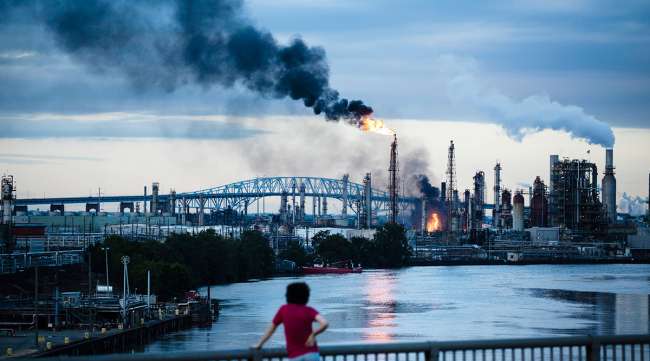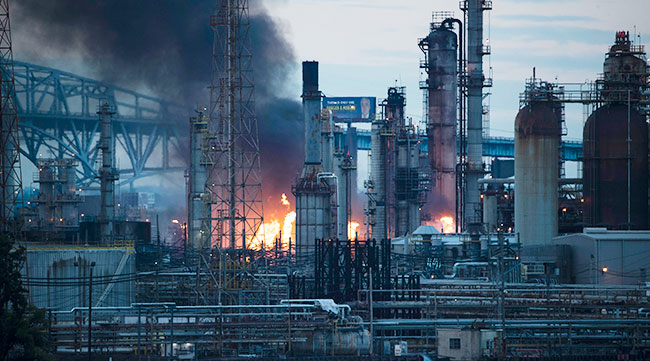Summer Driving Gets More Costly as East Coast Refinery Burns

[Stay on top of transportation news: Get TTNews in your inbox.]
Gasoline futures jumped the most in more than three months after an explosion and fire at the Philadelphia Energy Solutions oil refinery, the largest on the U.S. East Coast and a key supplier to the New York gasoline market.
The fire threatens to boost fuel prices from Delaware to Maine just as summer driving season begins, a time of peak demand. Gasoline for July delivery rose 3.9% on the New York Mercantile Exchange, threatening to undermine a 20-cent-a-gallon average price drop nationally in May and June.
Firefighters work to extinguish the flames after an explosion at a Philadelphia oil refinery pic.twitter.com/g3VROFD0KS
— TicToc by Bloomberg (@tictoc) June 21, 2019
The blaze could shut in about 4.2 million gallons a day of supply, enough to meet about 2.7% of East Coast demand, according to Bloomberg estimates. The fire, which injured five, will continue until it burns itself out or a valve that is still feeding the blaze the afternoon of June 21 is out, Philadelphia Deputy Commissioner Craig Murphy said.
“Any shortage ahead of the peak of the summer driving season does not bode well for U.S. consumer pocketbooks,” Joe Brusuelas, chief economist at RSM US LLP, said on Twitter.
The complex comprises the Point Breeze and Girard Point plants. It can process 335,000 barrels of crude a day. It sends fuel via pipeline and barge to New York and New England, and through pipelines to upstate New York and across Pennsylvania.
The blaze started after a leak in an alkylation unit, used to make high-octane gasoline, triggered explosions after which all the boilers stopped, causing a hard shutdown of the Girard Point section of the refinery, according to people familiar with the plant’s operations. The Point Breeze section was already undergoing repairs to its 50,000 barrel-a-day fluid catalytic cracker following a fire in a pump that occurred earlier this month.

Matt Rourke/Bloomberg News
The incident could redirect crude back into the market. About 8 million barrels of foreign crude is en route to Philadelphia, according to shipping fixtures compiled by Bloomberg.
PES is “likely to reoffer at least some of the inbound crude cargoes it has purchased from West Africa and the North Sea if its operations are significantly reduced for a long period of time,” Amrita Sen, chief oil analyst at Energy Aspects Ltd. in London, said in an e-mail.
The company believes what’s burning early evening of June 21 is mostly propane, Cherice Corley, a PES spokeswoman, said in an e-mailed statement. All employees were accounted for, she said. The Chemical Safety Board is deploying a four-person team to the site to investigate the fire.
Here's the moment a huge explosion took place at the PES refinery in Philadelphia.
Read more on the story via @business https://t.co/6xMNCFU6zn pic.twitter.com/2NuDKI7MQN — TicToc by Bloomberg (@tictoc) June 21, 2019
The fuel shortfall could be made up with inventory draws from the local region in the near term and from imports over the longer term, according to Andy Lipow, president of Lipow Oil Associates in Houston.
Supplies on the Colonial pipeline destined for other markets could be diverted into Pennsylvania, while it takes about 11 days for a tanker to reach the East Coast from Northwest Europe, according to Lipow. But, he said, “there’s certainly going to be price increases from an initial shortfall.”
Due to a smoke plume, residents and businesses in the area were initially asked to stay in their homes as a precaution, the City of Philadelphia Office of Emergency Management said in a tweet. The shelter-in-place request was subsequently lifted for portions of South Philadelphia, it said.
There have been refining operations for 150 years at the site, which has passed through a series of owners, including Chevron Corp. and Sunoco before being consolidated into Philadelphia Energy Solutions, a partnership formed between The Carlyle Group and Energy Transfer’s Sunoco. PES emerged from bankruptcy last year with new financing, with the original partners holding smaller stakes.



